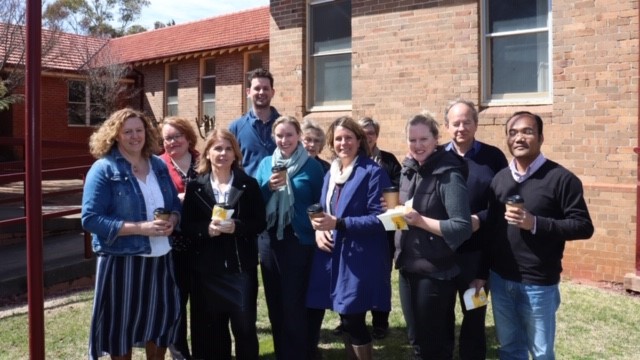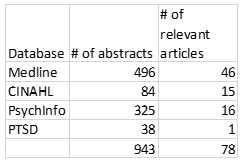We are excited to be connecting with Dr. Nelly Oelke throughout the course of her study leave in Australia! Dr. Oelke is an Advisory Committee member for the Rural Health Services Research Network of BC and will be continuing her work on exploring the mental health impacts of climate change events in rural communities among men and adults who are over the age of 50 at the Centre for Rural and Remote Mental Health. Join us in the last chapter of her journey in Orange, Australia!
December 1, 2019
My time at the Centre for Rural and Remote Mental Health (CRRMH) has ended, at least for this time around. My last day was Thursday, November 28th. I would like to thank David Perkins the Director for the Centre for the opportunity to spend a portion of my sabbatical time here to better understand the resources and approaches used here to promote mental health in rural and remote communities in New South Wales. I would also like to thank all of the team at CRRMH for their wonderful support, sharing of their work, and all of the other things you did to make my stay here in Orange special. I will remember all of you and look forward to continuing our work together on addressing the issues of rural adversity and promoting mental health and wellbeing.

To the left, I am standing with David Perkins, Director of CRRMH

The CRRMH Team in Orange, Australia
I would like to provide you with an update on the scoping review that I have been working on over the last few months. To refresh your memory, the focus of the scoping review is mental health interventions related to climate change and climate change events. Our inclusion and exclusion criteria were refined a number of times early in the scoping review process. In the end, we searched 4 databases (Medline, CINAHL, PsychInfo, and PTSD) for a yield of 943 abstracts for the last 10 years (2009 to present). What surprised us though was the number of articles that reported on mental health interventions related to climate change and climate change events. All of the screening has been completed other than those articles retrieved from relevant reference lists from included articles (120 references were deemed to be relevant from their title, only 49 are new articles not initially included in our database search). Out of the 943 abstracts, 78 were screened in at the relevancy stage (see table below). Given the number of articles that are relevant, the data extraction has been taking longer than anticipated.

Some key highlights thus far from the scoping review include: 1) most of the articles are from the US, many of them focused on hurricanes and particularly Hurricane Katrina; 2) the most common intervention is Psychological First Aid or Mental Health First Aid; and 3) there are also quite a number of articles that focused on school-based interventions. My plan is to complete the scoping review and submit for publication in January once I return to Canada.
This will be my last blog post for a while. I am off to New Zealand on December 2 for vacation before returning back to Kelowna. I will pick up again in the new year with a few more editions of the blog with updates about the scoping review, environmental scan of programs/resources in Canada and Australia, and my work back in Kelowna on this important issue of the climate change impacts on mental health.

